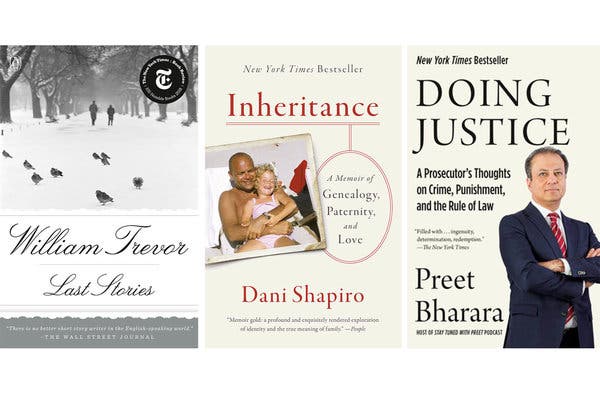LAST STORIES, by William Trevor. (Penguin, 213 pp., $17.) These 10 tales from the Irish virtuoso of the short story, who died in 2016, center on ordinary people whose lives veer in surprising directions. “In this small, final, seemingly quiet but ultimately volcanic book of stories, Trevor denies and defies — maybe spites — the promise of decline,” Cynthia Ozick wrote here.
INHERITANCE: A Memoir of Genealogy, Paternity, and Love, by Dani Shapiro. (Anchor, 249 pp., $16.95.) The memoirist and novelist Shapiro recounts her shocking discovery, via a DNA test after both of her parents had died, that she is biologically unrelated to her beloved father. Setting out to find the sperm donor, she reframes her notion of family and her Jewish identity. Our reviewer, Ruth Franklin, called the book “beautifully written and deeply moving.”
DOING JUSTICE: A Prosecutor’s Thoughts on Crime, Punishment, and the Rule of Law, by Preet Bharara. (Vintage, 345 pp., $17.) Bharara, a former federal prosecutor for the Southern District of New York and a popular podcaster, explains our justice system and shows the crucial role played by law in society. In these pages, Jennifer Senior wrote that “Bharara, as usual, makes a very strong case.”
THE DECENT INN OF DEATH, by Rennie Airth. (Penguin, 353 pp., $16.) This sixth book in the series by the South African-born Airth has Chief Inspector John Madden, along with another detective, investigating the seemingly accidental death of a church organist near Winchester. Our Crime columnist, Marilyn Stasio, called the Madden series “well worth reading, and rereading.”
UNQUIET, by Linn Ullmann. Translated by Thilo Reinhard. (Norton, 392 pp., $15.95.) In this sixth novel by Ullmann, whose parents are the actress Liv Ullmann and the director Ingmar Bergman, the author wrestles with family history by interviewing her father. The characters “seem stranger, sadder and more real than the actress and the filmmaker we might have thought we knew,” A.O. Scott wrote here.
THEY WERE HER PROPERTY: White Women as Slave Owners in the American South, by Stephanie E. Jones-Rogers. (Yale University, 296 pp., $18.). Jones-Rogers, a professor at the University of California, Berkeley, shows that while historians have often misrepresented white women as reluctant slaveowners, they were eager and frequently violent participants. The Times’s Parul Sehgal called the book “a taut and cogent corrective.”













